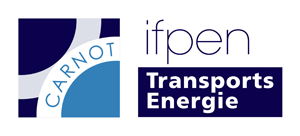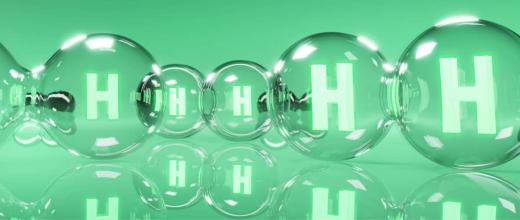
 Hydrogen
Hydrogen
Our solutions
- Natural hydrogen
- Hydrogen production
- Hydrogen transport and storage
- Hydrogen conversion and use in mobility
NATURAL HYDROGEN: UNDERSTANDING AND QUANTIFYING HYDROGEN RESOURCES
It is now established that molecular hydrogen (H2) exists naturally on the planet in the form of diffuse or continuous emanations. Since 2008, IFPEN has studied this type of gas emanation in various locations on the Earth's surface to assess these resources. This research has revealed that natural H2 is preferentially found in several types of geological environments.
The current research at IFPEN aims to develop knowledge to address questions related to the origin and mechanisms of formation, consumption during migration to the surface, and to create tools for geological exploration. The goal is to offer industry methods for quantifying resources and potential reserves.
HYDROGEN PRODUCTION
IFPEN is actively involved in the development of different renewable and low-carbon production technologies via its expertise and research conducted within various collaborative projects and partnerships.
Decarbonizing hydrogen via CO2 capture
Currently, 95% of hydrogen production is based on the conversion of hydrocarbons via reforming and gasification processes. When combined with CO2 capture and geological storage techniques, this hydrogen can become “decarbonized” hydrogen. Active throughout the entire CCUS value chain, IFPEN works with AXENS and other industrial players on the development of innovative capture processes (post- and oxycombustion) that are economically viable and applicable to industrial processes.
IFPEN also works on the development of technologies, such as that implemented in BioTfueL®, making it possible to produce low-carbon hydrogen from syngas, resulting from steam reforming or biomass gasification, through CO2 capture via an amine-based process.
A new economical and efficient electrocatalyst for renewable hydrogen production
IFPEN is contributing to the collaborative MoSHy project that, using a combination of experimentation and molecular modeling, is aimed at replacing platinum-based electrocatalysts in recently industrialized PEM (Proton Exchange Membrane) technologies for hydrogen production via water electrolysis.
HYDROGEN TRANSPORT AND STORAGE
While renewable or low-carbon hydrogen produced can be used directly at its place of production or stored for subsequent reconversion into electricity, it can also be injected into the natural gas distribution network. Within the context of its research focusing on corrosion and CCUS, as well as its participation in a hydrogen research consortium, IFPEN has developed expertise enabling the various problems associated with its storage and transport to be overcome.
Resistance of materials in the presence of hydrogen
The quantity of injectable hydrogen is limited for several reasons: the dihydrogen molecule is small, highly inflammable (more than the gas) and considered to be corrosive when in contact with metals, particularly steel, the major component of the natural gas transport network. The risks of leaks and material durability thus raise crucial safety issues for the transporter, and represent a significant challenge to the deployment of hydrogen that IFPEN’s teams and their partners are working on. Part of the research relates to corrosion in an aqueous environment and in the presence of corrosive gases such as hydrogen.
Studies, conducted in harsh environments, under high-pressure and high-temperature conditions, also use modeling to gain a better understanding of the physicochemical mechanisms and predict long-term corrosion kinetics.
Storage in salt caverns or porous media
The increased share of non-manageable wind and photovoltaic electricity production requires the development of energy storage solutions. Large-scale hydrogen storage, primarily in salt caverns currently, can help smooth out seasonal variations.
IFPEN’s expertise and tools developed for CCUS and oil and gas exploration/production may, through adaptation, address problems posed by underground hydrogen storage. In particular, they make it possible to:
• model the mechanical resistance of storage facilities, model reservoir behavior: COORES Flow software is used for the 3D simulation of fluid flows, the transport of chemical species via these flows and rock/fluid interactions;
• gain a better understanding of the mechanisms governing hydrogen mobility and reactivity in geological formations.
Storage site monitoring
IFPEN’s research concerns the development of the Flair Suite, a package of solutions enabling the monitoring of industrial site gases in the atmosphere and on the ground. These tools are used to detect potential leaks at gas storage sites or in distribution networks at the earliest possible stage and identify the source of the plume. They can detect and measure a broad range of gases, particularly methane, CO2 and hydrogen.
HYDROGEN CONVERSION AND USE IN MOBILITY
IFPEN is currently working on various solutions for the use of renewable or low-carbon hydrogen to reduce the environmental impact of mobility:
- hydrogen used to power a fuel cell that generates on-board electricity for electric vehicles,
- hydrogen as a fuel in an internal combustion engine.
- integration of decarbonated H2 in the production of advanced biofuels, in the form of e-biofuels that can be used by heavy transport (land or sea), off-road vehicles and aviation
The fuel cell (FC) for electric vehicles
For electric propulsion, the fuel cell offers an alternative to pure batteries vehicle, its main advantage being higher energy storage density, combined with a much quicker recharging time.
IFPEN and its partners are working on an approach at FC system level in the vehicle environment, and in particular on optimizing the system's energy management and reducing costs, primarily using one-of-a-kind digital and experimental resources.
More specifically, IFPEN's work focuses on various aspects:
- Methods for detailed characterization of on-vehicle operation in the laboratory (chassis dynamometer). A recent test campaign has led to the development of a dedicated method for measurement of hydrogen consumption where the flow rate cannot be measured directly and thereby precisely calculate the efficiency of the FC. In addition, IFPEN will be taking part in a programme to monitor and analyse the operation of a fleet of urban busses in commercial-use l use in 2022.
- Characterization of FC systems on a dedicated test bench: IFPEN is equipped with a 210-kW test bench that will enable the testing of complete FC systems for a large variety of vehicles, including bus, truck and off-road applications.
- The control and power electronics specific to this type of systems.
- Modelling, including the development of system ageing models. This knowledge is vital, since the system’s ageing has an impact on vehicle performance, range, cooling requirements and total cost of ownership. IFPEN has recognized expertise in this field, and is currently in discussions with an industrial partner to co-develop specific libraries.
- The characterization of auxiliary system components such as e-compressors, for example, that allows optimization of the FC systems on dedicated testing resources.
- Economic and life cycle analysis of the hydrogen industry. In particular, calculations are underway to determine the total cost of ownership of the vehicle to help fleet managers make the right choices. The overall environmental impact of these vehicles is also being assessed.
The hydrogen thermal engine / H2 engine
Carbon-free hydrogen conversion can be achieved by the combustion of hydrogen in a combustion engine. This solution opens up the possibility of accelerating the short/medium-term deployment of carbon-free mobility at a lower cost.
For this reason, IFPEN is working to optimize combustion systems with a view to maximising efficiency and achieving near-zero nitrogen oxide emissions. To do this, it is primarily deploying its tools developed by system simulation in collaboration with Siemens Digital Industry Software and via 3D modelling with Convergent Science Inc. (CSI). IFPEN also has specific resources, such as an optical diagnostic bench for visualizing hydrogen injection and multiple engine test benches: one single-cylinder or multi-cylinder for light vehicles, and a further two for heavy vehicles; one single-cylinder, the other multi-cylinder.
The various topics are usually approached in partnership with industrial players, for example as part of a consortium in the field of heavy duty vehicles.
Projects currently underway are particularly focused on the optimization and design of hydrogen combustion systems: specifically, the optimization of hydrogen-air mixture homogenization and the control of hot spots to avoid pre-ignition type abnormal combustion, as well as the level of turbulence and air fuel ratio of the mixture in order to achieve very high efficiencies of almost 50% without significant pollutant emissions. The results obtained confirm the potential of this technological solution.
Meanwhile, IFPEN is also involved in the following technological fields:
- The design of the engine's air loop and in particular the supercharging system, primarily using system simulation tools.
- NOx emission control, both by exhaust gas aftertreatment (SCR) systems and by water injection technologies upstream of combustion.
- The compatibility of engine materials with hydrogen.
- Lubricant properties and control of their potential impact on particulate emissions.
- Life cycle analysis and costing of vehicles.

E-fuels
E-fuels, synthetic fuels produced from “green” electricity, group together different products. Some are produced by Fischer-Tropsch synthesis using green hydrogen. IFPEN is working on this process and the associated catalysts, particularly for biofuel production.













